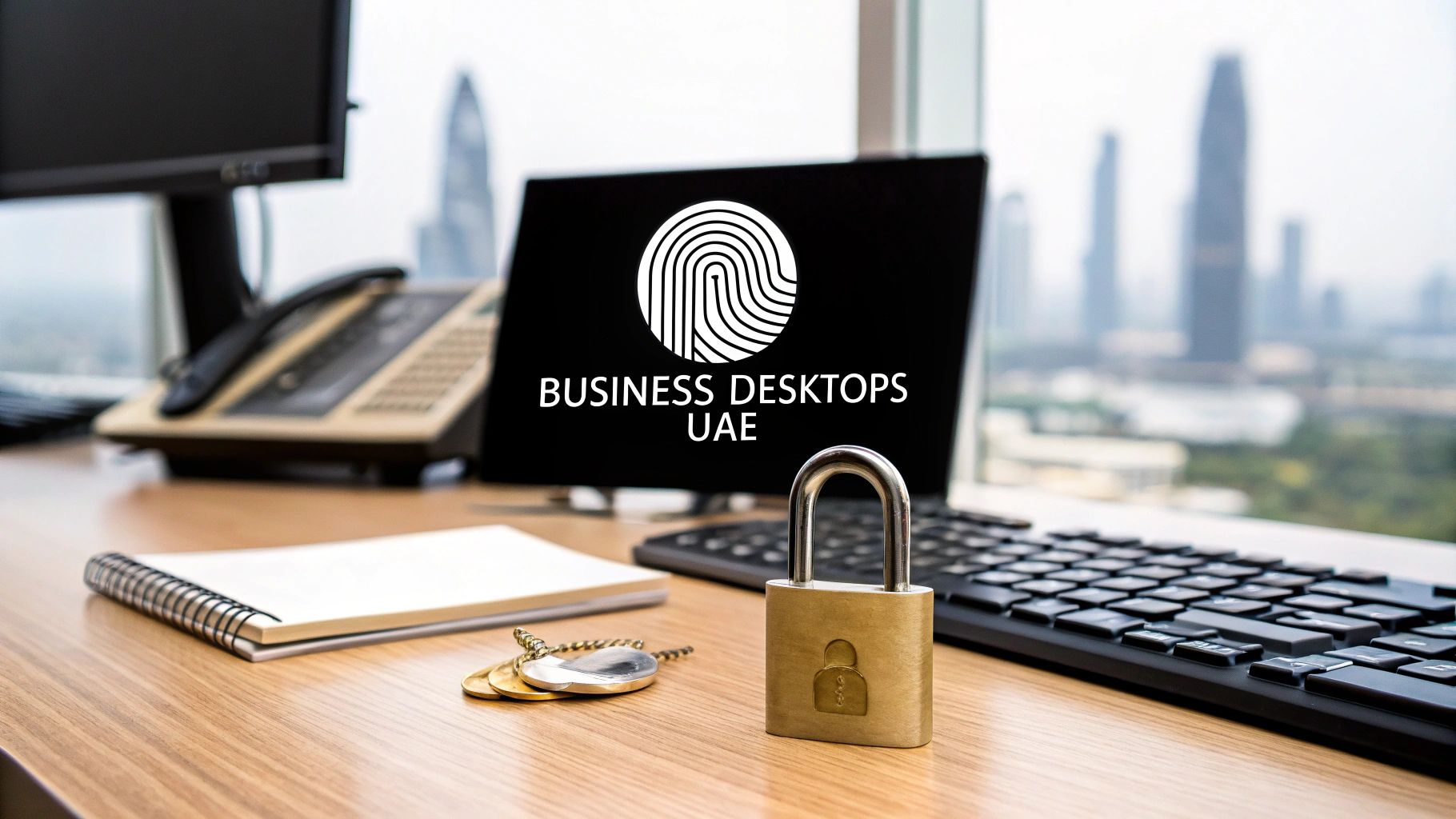
Choosing the right business desktops for your team in the UAE is a balancing act. You need powerful hardware that fuels efficiency, but you also need to lock down security to meet strict local regulations. My advice? It's about looking at what your team actually does day-to-day, picking hardware that gives you room to grow, and finding a local IT partner who genuinely gets the region's support needs and data laws. This isn't just about buying computers; it's a strategic move that will define your productivity and data security for years to come.
Building Your IT Foundation in the UAE
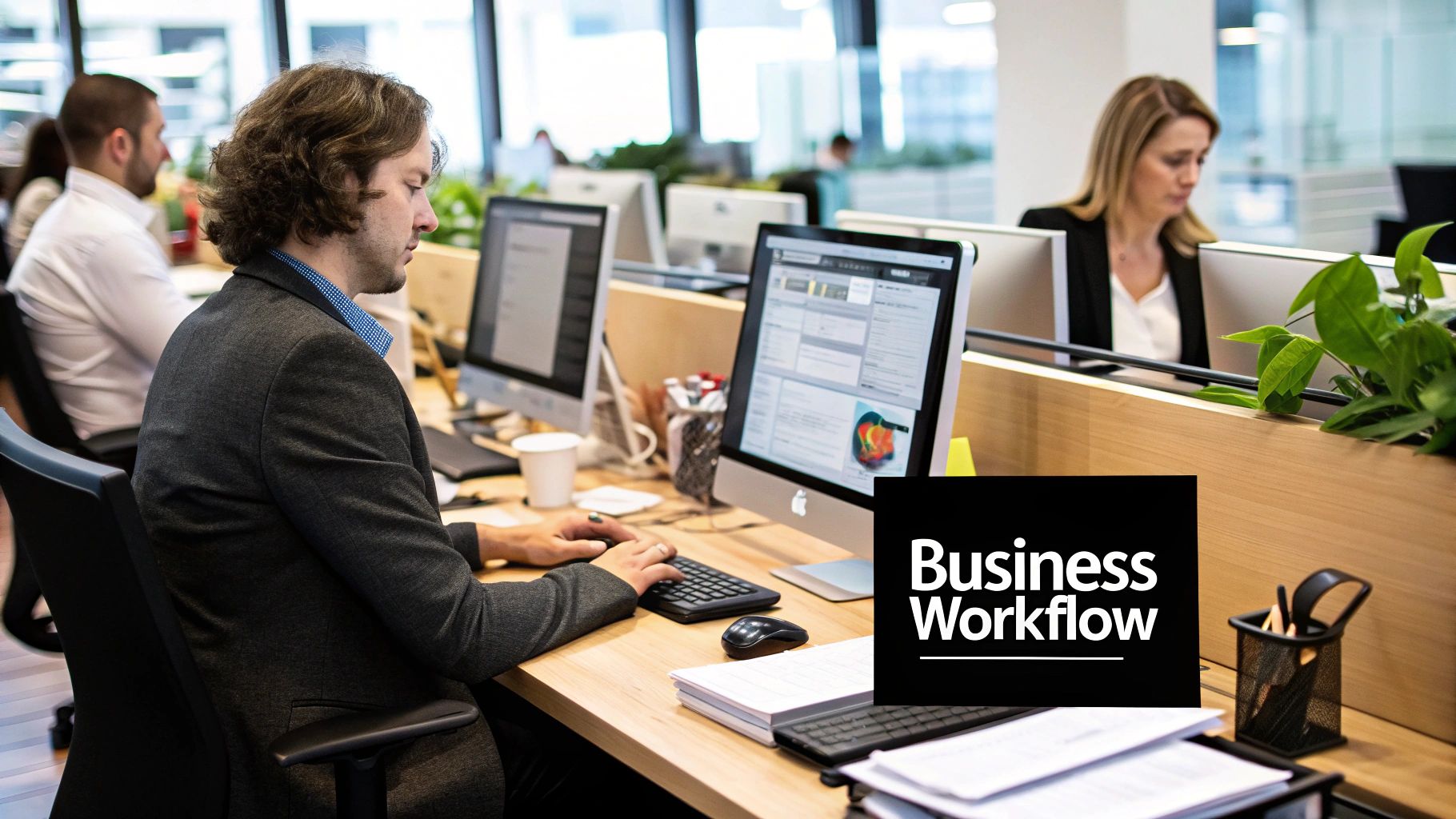
Getting your business desktops right is one of the most fundamental decisions you'll make. It’s not just another line item on a procurement list. Think of it as laying the foundation for a productive, secure, and resilient operation. In the fast-paced UAE business world, where digital adoption is soaring and data laws are tight, a thoughtful strategy is non-negotiable.
A generic, one-size-fits-all approach just won't cut it here. You have to consider the local landscape to make a choice that truly fits your organisation.
Navigating the Local Market Dynamics
The UAE's personal computer market is huge, generating USD 2.5 billion in 2024 and forecasted to climb to USD 4.4 billion by 2030. Interestingly, laptops dominate this market, which tells you a lot about the shift towards mobility and hybrid work. For anyone buying desktops, this means your fixed workstations must play nicely in a mobile-first world. That puts a premium on rock-solid security and seamless remote access.
A desktop purchase should never be made in isolation. It has to support your company’s bigger picture—from boosting employee output to staying compliant with regulations—ensuring every dirham spent delivers real value.
Key Considerations for UAE Businesses
Before you even start looking at models, take a step back. There are a few region-specific factors that should shape your thinking from the outset. Nailing these down early will save you from expensive headaches down the line.
-
What software are you really using? If your teams are running heavy-duty applications for design, finance, or engineering, that software's needs will dictate your hardware specs. Don't guess.
-
How does this fit a hybrid model? Your desktops need to securely support staff who work both in the office and remotely. Secure remote access isn't a "nice-to-have"; it's essential.
-
Are you compliant with local data laws? The UAE's data protection laws are no joke. Your machines must have built-in security features to protect sensitive company and client information.
-
Who will you call when things go wrong? Partnering with a reliable local provider is crucial. If you need expert guidance on this, our complete overview of IT support in Abu Dhabi is a great place to start.
Matching Hardware to Your Team's Workflow
Let's get real about buying desktops. It's easy to get lost in spec sheets and marketing jargon, but the secret to a smart investment is looking past all that and focusing on what your team actually does day-to-day. Choosing the right hardware isn’t about buying the most powerful machine; it’s about perfectly matching the core components—the CPU, RAM, and storage—to the real-world demands of your business here in the UAE.
Going with a single, standard setup for everyone is a classic mistake. It almost always means you're overspending on desktops for some of your staff while leaving your power users with machines that can't keep up. The result? Hidden bottlenecks that slowly but surely kill productivity. The trick is to think about your employees as individuals with very different jobs.
What Really Matters: CPU, RAM, and Storage
To make the right call, you need to understand the big three: the Central Processing Unit (CPU), Random Access Memory (RAM), and storage. These three components work together to dictate how fast and smooth a computer feels in daily use.
Think about it this way: a creative agency in Dubai Media City, with designers running the full Adobe Creative Suite and rendering 3D models, absolutely needs a beast of a processor like an Intel Core i7 or i9. They'll also need a hefty 32GB of RAM to juggle those massive files without everything grinding to a halt.
Now, contrast that with a logistics company out in JAFZA. Their team is mainly working in ERP software, firing off emails, and building spreadsheets. For them, a reliable Intel Core i5 with 16GB of RAM is more than enough to keep things running smoothly and efficiently.
The goal is to stop paying for power you don't need. Your finance team shouldn't be staring at a frozen screen waiting for a spreadsheet to calculate, but your administrative assistant doesn't need a top-of-the-line graphics card just to work in Microsoft Office.
This graphic gives a great visual breakdown of the baseline specs needed for most modern business roles.
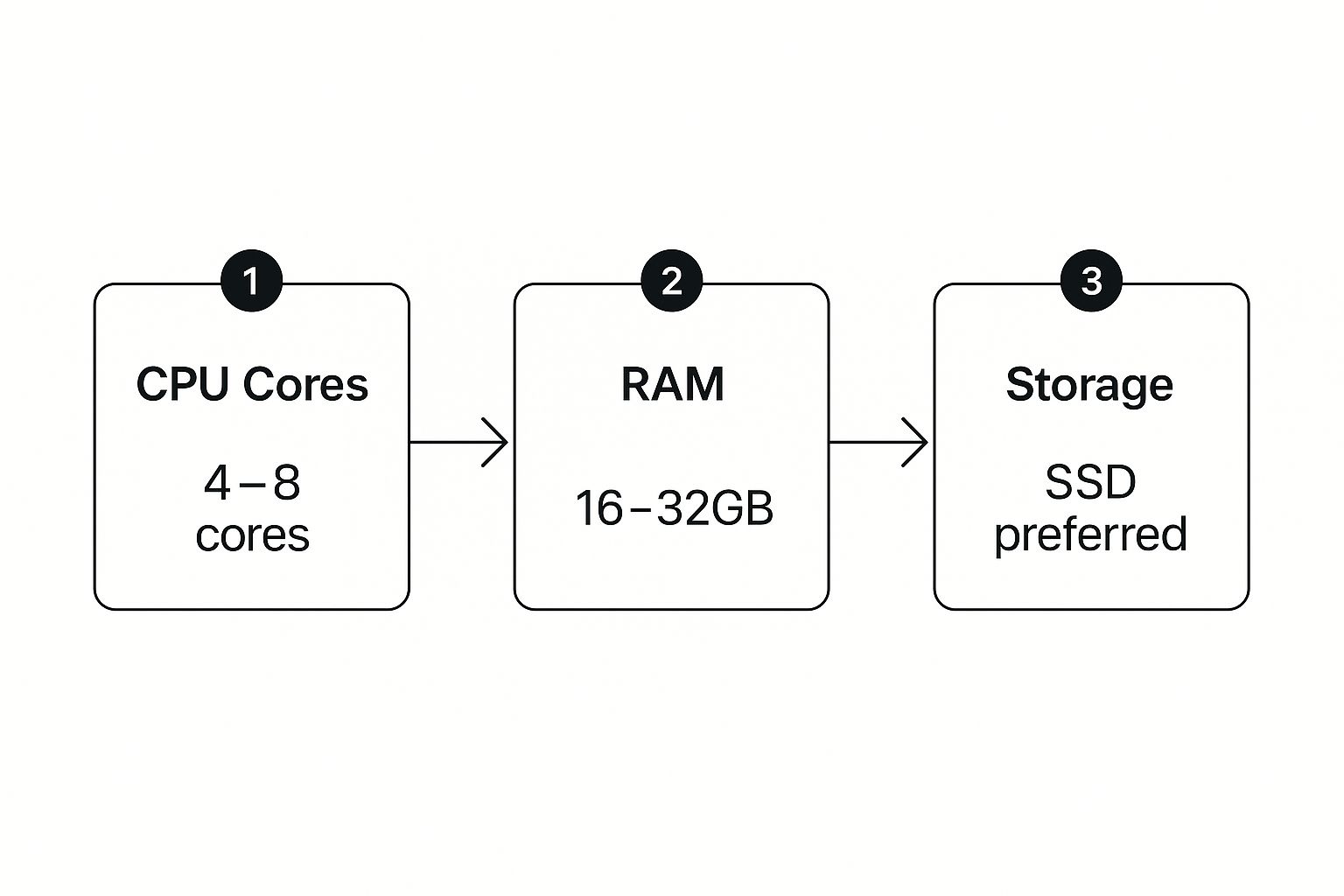
As you can see, the foundation for a productive setup is a capable multi-core processor, enough RAM to multitask without a hiccup, and the snappy performance of an SSD. Get that combination right, and you've eliminated one of the biggest sources of daily frustration for your team.
To make this even clearer, I've put together a table that breaks down hardware recommendations for common roles you'd find in any UAE business.
Hardware Recommendations Based on Employee Roles
This table offers a practical guide to help you match desktop specs directly to the needs of different professionals in your organisation, ensuring you invest wisely.
| Employee Role | Recommended CPU | Recommended RAM | Storage Type & Size | Graphics Card |
|---|---|---|---|---|
| Administrative Staff | Intel Core i3 / AMD Ryzen 3 | 16GB | 256GB NVMe SSD | Integrated |
| Sales & Marketing | Intel Core i5 / AMD Ryzen 5 | 16GB | 512GB NVMe SSD | Integrated |
| Finance / Accounts | Intel Core i5 / AMD Ryzen 5 | 16GB – 32GB | 512GB NVMe SSD | Integrated |
| Software Developer | Intel Core i7 / AMD Ryzen 7 | 32GB | 1TB NVMe SSD | Integrated or Basic Dedicated |
| Graphic Designer | Intel Core i7 / AMD Ryzen 7 | 32GB | 1TB NVMe SSD | Dedicated (NVIDIA RTX 3060+) |
| Video Editor / 3D Artist | Intel Core i9 / AMD Ryzen 9 | 32GB – 64GB | 1TB+ NVMe SSD | Dedicated (NVIDIA RTX 4070+) |
Using this as a starting point, you can create customised hardware profiles that deliver exactly what each department needs to excel.
Why 16GB RAM Is the New Normal
Not too long ago, 8GB of RAM was perfectly fine for a business computer. Those days are over. With countless browser tabs open, video calls running in the background, and multiple apps being used at once, 16GB has firmly become the new baseline for productive work. Anything less, and you're asking for slowdowns that directly impact your bottom line.
And for your real power users—the developers, video editors, or data analysts sifting through massive datasets—bumping them up to 32GB or even 64GB is a no-brainer. It's an investment that pays for itself almost immediately in time saved and frustration avoided.
When an employee has to close one program just to open another, you're losing more than just a few seconds. You're shattering their focus and breaking their workflow. Upgrading RAM is one of the most cost-effective ways to boost daily output across your entire organisation.
The Game-Changing Speed of an SSD
If you have any business desktops still running on old-school Hard Disk Drives (HDDs), the single best upgrade you can make is to switch to a Solid-State Drive (SSD). The difference is truly night and day.
- Lightning-Fast Boot Times: Computers start up in seconds, not minutes.
- Instant App Loading: No more drumming your fingers waiting for software to open.
- Quick File Transfers: Moving large files is dramatically faster, a huge plus for anyone working with big data or media.
For the best performance, look for an NVMe SSD. They are even faster than standard SATA SSDs and are perfect for workstations that need to read and write data constantly. While HDDs are still great for cheap, long-term archival storage, they have no place as the primary drive for your operating system and applications in a modern business.
Do You Really Need a Dedicated Graphics Card?
For the vast majority of office work—we're talking email, Word documents, and browsing the web—the integrated graphics that come built into modern CPUs are all you need. Paying extra for a dedicated Graphics Processing Unit (GPU) for these roles is simply a waste of money.
However, a dedicated GPU from a brand like NVIDIA or AMD is non-negotiable for certain specialised jobs:
- Creative Professionals: Graphic designers, video editors, and 3D artists depend on powerful GPUs to render complex visuals and cut down on export times.
- Engineers and Architects: Anyone using CAD software needs a professional-grade GPU to smoothly manipulate intricate models and simulations.
- Data Scientists: Some AI and machine learning tasks can be accelerated massively by the parallel processing capabilities of a high-end GPU.
Take a close look at who actually needs this specialised hardware. By being selective, you can put your budget where it matters most, making sure every dirham you spend helps choose business desktops in the UAE that drive real performance gains.
Building a Digital Fortress for Your Business
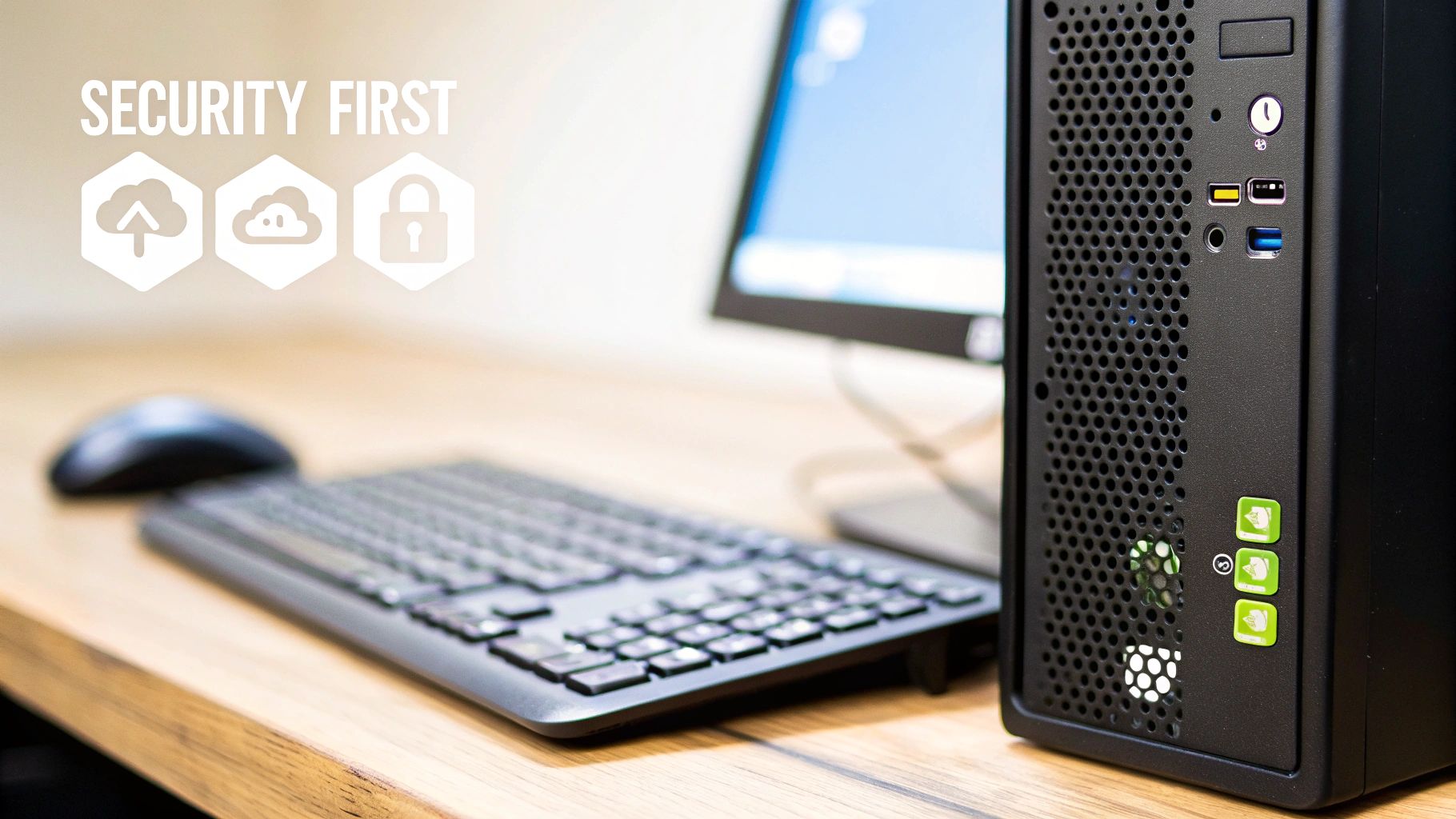
In the UAE's demanding business world, top-tier digital security isn't just a nice-to-have feature on a spec sheet—it's a core requirement for survival and compliance. A single data breach can do more than just cost you money; it can shatter your company's reputation and bring on serious regulatory penalties.
When you're looking to choose business desktops in the UAE, think of it as building a digital fortress. Your first priority must be to protect your data.
This goes way beyond simply installing antivirus software. Real security starts at the hardware level, creating layers of protection that are incredibly difficult for cybercriminals to break through. It's about building a defence so solid that it deters threats before they even get a chance to start.
Hardware-Level Security Your Desktops Must Have
The best security measures are the ones baked right into the hardware of your desktops. These features create a secure foundation that software-only solutions just can't replicate. It’s like reinforcing the castle walls before you even think about posting guards at the gate.
A critical piece of this puzzle is the Trusted Platform Module (TPM). This is a dedicated microchip that secures the hardware itself by integrating cryptographic keys directly into the device. For any business operating in the UAE, a TPM 2.0 chip is non-negotiable. It’s the backbone of modern data encryption and a must-have for professional operating systems.
And don't forget about the physical security of the machines, especially if you have an open-plan office or a lot of foot traffic.
- Biometric Fingerprint Readers: These offer a quick, secure, and easy way for authorised users to log in. This massively cuts down the risk that comes from weak or stolen passwords.
- Kensington Lock Slots: It sounds simple, but this physical lock slot lets you cable the desktop to a desk, stopping an opportunistic thief from walking away with the whole machine—and all the sensitive data on it.
Modern security isn’t just about stopping remote attacks. It's about a complete strategy that protects your data from both digital and physical threats. Ignoring hardware-level features is like leaving a back door wide open.
The Critical Role of a Professional Operating System
The operating system you choose is the command centre for your entire digital security setup. Consumer-grade operating systems are fine for home use, but they simply don't have the advanced security and management tools that a business needs to stay safe and compliant.
This is where a professional-grade OS becomes absolutely essential, and for most businesses, that means something like Windows 11 Pro. This choice is especially relevant in our region. With Windows holding a dominant market share of around 51.77% for desktop operating systems in the UAE as of mid-2025, its security protocols are more important than ever. Its widespread use means it's a common target, making features like regular patching and endpoint management vital for fending off the sophisticated cyber threats aimed at GCC countries. You can see the latest stats on the UAE's OS market here.
A professional OS gives you access to powerful, business-focused tools that you just won't find on the home versions.
Unlocking Essential Security Tools
Once you have a professional OS, you can activate the critical security features that form the core of your data protection strategy. These are the tools designed to keep your information safe, whether the device is in the office or being used remotely.
One of the most powerful tools you get is BitLocker Drive Encryption. Working hand-in-hand with the TPM chip, BitLocker encrypts the entire hard drive, turning the data into unreadable gibberish for anyone without the right credentials. If a desktop is stolen, the thief gets a useless box, not your company's secrets.
On top of that, a professional OS provides advanced device management capabilities. This gives your IT team the power to:
- Enforce Security Policies: Make sure every desktop follows company-wide security rules, like requiring strong passwords and enabling firewalls.
- Manage Updates Centrally: Roll out critical security patches to all machines at once, closing vulnerabilities before attackers can find them.
- Perform Remote Wipes: If a device is lost or an employee leaves, your IT team can remotely erase all corporate data, ensuring it never falls into the wrong hands.
These aren't just optional extras; they're fundamental for protecting your business in the UAE's strict regulatory climate. They provide the control you need to prevent breaches and stay compliant. For more on this, check out our guide on the smartest way to keep your business network secure and reliable. By focusing on these security elements from the start, you ensure your desktop fleet is a productive asset, not a risky liability.
Finding the Right Local IT Partner in the UAE
Let’s be honest, picking out new desktops is the easy part. The real measure of that investment comes six months down the line when a critical workstation fails right before a deadline. A powerful PC is useless if it's not working, and that’s why choosing the right local IT partner is probably the most important decision you'll make in this entire process.
This isn’t just about buying a box. It's about finding a team on the ground here in the UAE that gets the local business pace, has technicians who can get to you quickly, and understands that downtime is a killer for your bottom line.
Major Brands vs. Local Distributors
When it’s time to buy, you really have two main avenues in the UAE. You can go straight to the big international names like Dell or HP, or you can work with the well-established local distributors—many of whom you’ll find in hubs like Dubai's Computer Street (Khalid Bin Al Waleed Street). Both have their pros and cons.
Going direct to a big brand feels safe. You get a predictable experience and a standard global warranty. The downside? Support can feel a bit remote, often routing you through international call centres, which can mean slower response times when you need someone physically in your office.
On the flip side, a good local distributor can offer a much more personal touch and often more flexibility. They might have better stock of certain parts and can sometimes be more competitive on price. The trick is to do your homework and vet them properly.
What to Look for in a Support Agreement
Never, ever sign a purchase order without reading the fine print on the warranty and support agreement. That great upfront price can quickly turn into a financial headache if the after-sales service is poor. A solid Service Level Agreement (SLA) is your best insurance policy against lost productivity.
Here’s what you should be looking for as a bare minimum:
- On-Site Support: Remote help is fine for software glitches, but for a dead power supply or a failed motherboard, you need a technician in your office. Make sure on-site service is included, not a pricey add-on.
- Guaranteed Response Time: "We'll get back to you soon" doesn't cut it. Your agreement should specify a next-business-day (NBD) on-site response for critical hardware failures.
- Local Parts Inventory: Ask them directly: "Do you keep spare parts like power supplies, RAM, and hard drives stocked locally?" Waiting for a component to ship from Europe or Asia can turn a simple one-day fix into a week of lost work.
An IT partner’s responsiveness is a direct measure of how seriously they take your business's uptime. Don't settle for a vague promise of "support." Demand a concrete, contractual SLA that protects your operations.
The UAE's desktop market is valued at around $268 million in 2024, and this steady, consistent growth keeps the market competitive. For you, this is a good thing. It means suppliers are hungry for your business, giving you the leverage to demand better service and access to the latest tech. To get a better sense of the market, you can find more on UAE desktop market trends on IndexBox.
Key Questions to Ask Potential IT Partners
Before you commit, you need to interview potential suppliers. Think of it less like a sales call and more like a job interview for a critical role in your company. Their answers will tell you everything you need to know about their capabilities.
A truly valuable partner does more than just shift hardware; they become an extension of your own team. To see what top-tier service looks like, it's worth exploring what professional IT support services in Dubai typically include. It sets a good benchmark for what you should expect.
Use this checklist to guide your conversations:
- What, exactly, does your standard warranty cover? Get them to be specific about parts, labour, and any exclusions.
- Where are your technicians based? A partner with engineers in both Dubai and Abu Dhabi is going to be far more effective than one operating out of a single office.
- What’s your escalation process for a major incident? You need to know who to call when a problem isn't getting solved fast enough through the standard channels.
- Do you offer deployment and asset management services? A partner who can handle imaging, setup, and tracking your new desktop fleet will save your internal team a huge amount of time and effort.
Choosing the right local partner turns a simple purchase into a real strategic advantage, making sure your team stays productive and your hardware stays reliable for years to come.
Thinking Beyond the Price Tag with Total Cost of Ownership
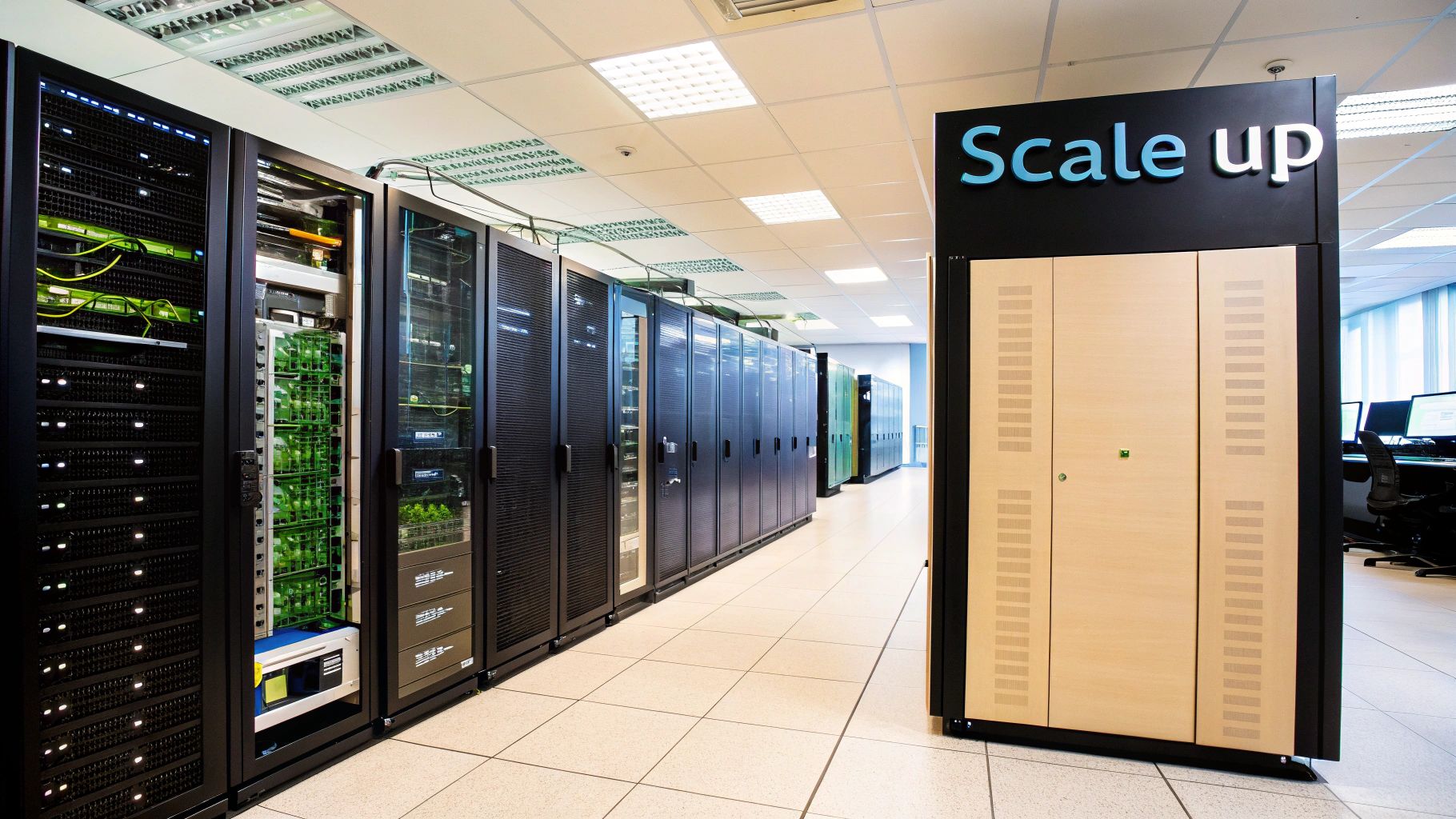
It’s easy to focus on the initial invoice when buying new desktops. That’s the number everyone sees in the budget meeting, after all. But focusing only on the upfront price is a classic mistake. The real, lifetime cost of that hardware is much higher, and to make a genuinely smart investment, you need to understand the Total Cost of Ownership (TCO).
Looking at TCO completely changes your perspective. You stop seeing it as a one-time purchase and start treating it as a strategic asset. It forces you to think about all the other expenses that crop up over the typical three-to-five-year lifespan of a business PC.
Uncovering the Hidden Costs
The most significant expenses tied to a fleet of desktops are often invisible on the initial quote. These ongoing costs can quietly eat away at your IT budget if you haven't planned for them. When you choose business desktops in the UAE, factoring in these variables from day one is crucial.
I've seen many businesses get caught out by these often-overlooked costs:
-
Energy Consumption: A floor full of power-hungry desktops running all day, every day, adds up. Especially during the UAE's hotter months, the impact on your utility bills can be substantial. Always look for machines with high energy-efficiency ratings, like ENERGY STAR®, to keep those operational costs in check.
-
Software Licensing and Subscriptions: The operating system is just the start. You'll need antivirus protection, productivity suites like Microsoft 365, and any specialised software your teams rely on. These are recurring costs, not one-offs.
-
Maintenance and Repairs: What’s the plan when a hard drive fails just after the warranty expires? Factoring in potential repair bills or the cost of an annual maintenance contract gives you a much more realistic financial picture.
This holistic view ensures your desktop fleet remains a powerful tool for your business, not a constant source of surprise expenses.
The Strategic Value of Upgradeability
One of the best ways to lower your TCO is to make your hardware last longer. It sounds simple, but choosing PCs that are easy to upgrade is a powerful strategy. A machine you can beef up in two years is infinitely more valuable than a sealed box that becomes obsolete.
I always advise clients to peek inside the case—or at least look at the spec sheet—for expandability. You're looking for easily accessible components, extra RAM slots, and additional drive bays.
A desktop that ships with two 8GB RAM sticks but has four slots in total is a smart buy. It gives you a clear and affordable path to a 32GB upgrade down the line. That simple feature can easily add another two years of productive life to the machine for a fraction of the cost of replacing it.
This kind of forward-thinking means that when performance starts to lag in a couple of years, the solution is a quick, inexpensive component swap, not a massive and disruptive hardware refresh.
Comparing Form Factors for Long-Term Impact
The physical design of a desktop—its form factor—has a bigger impact on TCO than you might think. It affects everything from how much office space you need to how difficult (and expensive) maintenance becomes. The choice between a classic tower and a sleek All-in-One (AIO) is about more than just aesthetics.
Let's break down how each style impacts your budget and workspace over time.
| Form Factor | Primary Advantages | TCO Considerations |
|---|---|---|
| Traditional Tower | Highly upgradeable, better cooling, and much easier to repair with standard parts. | They can be bulky and take up more desk space. However, their long-term costs are often lower due to cheaper and easier component upgrades. |
| All-in-One (AIO) | Sleek, space-saving design with fewer cables. They look fantastic and create a clean, modern workspace. | Repairs are complex and expensive. Upgrades are usually limited to just RAM and storage, if they're possible at all. If one part fails—like the screen—you might have to replace the entire unit. |
| Mini PC | Incredibly compact and energy-efficient. Perfect for minimalist setups or where space is at a premium. | You get very little upgradeability, and performance is generally lower than their larger cousins. They're best for less demanding roles. |
For most businesses in the UAE that need a solid balance of performance and long-term value, the traditional tower is still the most cost-effective choice. While an AIO might look great in a client-facing reception area, the tower’s flexibility and lower maintenance costs almost always result in a better TCO over its lifespan.
Clearing Up Your Final Questions on Business Desktops
It's completely normal to have a few last-minute questions before making a big investment in new hardware. You've done the research, you've got a plan, but those nagging "what ifs" can still pop up. That’s a good thing—it means you’re being thorough.
Getting these final details right is what separates a simple purchase from a smart, strategic decision that will serve your business well for years. To help you cross that finish line with confidence, I've pulled together the most common questions we get from business owners and IT managers across the UAE.
Think of this as your final checklist.
What’s the Real Lifespan of a Business Desktop?
In a typical UAE office, you should expect a solid three to five years of productive use from a well-maintained business desktop. Once you get past that mark, you'll likely notice performance starting to struggle with modern software, and the chances of a hardware failure start to creep up.
But you can definitely stretch that. The smartest move is to buy models that are easy to upgrade from the start—look for extra slots for RAM and storage. A simple RAM upgrade in year three can often squeeze another one or two years of good performance out of a machine, and it costs a fraction of a full replacement.
Also, don’t underestimate the local climate. Your office might be air-conditioned, but consistent, effective cooling is what keeps internal components from aging prematurely. Good airflow inside the PC case matters.
Are All-in-One PCs a Smart Choice for Our Dubai Office?
All-in-One (AIO) PCs look fantastic, there’s no denying it. For the modern, design-conscious offices you see all over Dubai and Abu Dhabi, they can be a perfect fit. Their clean, space-saving design with minimal cables is a huge plus.
They really shine in specific roles:
- Customer-facing desks: Perfect for a reception area or a client consultation room where first impressions count.
- Admin and general staff: Great for everyday office tasks where you don't need massive processing power.
- Tight spaces: If every square metre of desk real estate is precious, AIOs are a lifesaver.
However, you need to be aware of the trade-offs. A traditional desktop tower will almost always give you better performance for the price, superior cooling for heavy workloads, and is far easier (and cheaper) to repair or upgrade. For your power users—the designers, engineers, or finance pros running complex models—a tower is usually the more practical long-term investment.
Choosing between an AIO and a tower isn't just about aesthetics; it's a strategic call on future maintenance costs and upgrade potential. Always match the hardware to the job role.
How Crucial is On-Site Warranty and Support?
In a single word: essential. Here in the UAE, the pace of business is relentless. Any downtime is not just an inconvenience; it's lost productivity and lost revenue. You simply can't afford to have a key employee's computer out of commission for days while you figure out a fix.
This is where an on-site warranty with a fast, guaranteed response time—like a Next Business Day (NBD) service—is your best insurance policy. It means a qualified technician comes to your office to get the problem sorted, right then and there. It completely removes the logistical headache of packing up a faulty machine and shipping it off for who-knows-how-long.
Don't ever treat a strong local warranty as an optional extra. It’s a core part of your business continuity plan.
Should We Go for Pre-Built or Custom-Built Desktops?
We get this question a lot, but for nearly every business, the answer is clear: stick with pre-built desktops from major, reputable brands like Dell, HP, or Lenovo.
For business use, they are the undisputed winners. Here’s why:
- Rock-Solid Warranties: They come with comprehensive, enterprise-level support and on-site service that’s almost impossible to match with a custom build.
- Proven Reliability: These machines are tested relentlessly. All the components are certified to work together seamlessly, which drastically reduces the risk of random, frustrating glitches.
- A Single Point of Contact: If something goes wrong, you have one number to call. You're not stuck trying to figure out if it’s the RAM, the motherboard, or the power supply that’s failed.
Custom-built PCs are great for hobbyists or very niche, specialised applications—think scientific computing or high-frequency trading. But for 99% of businesses, they lack the unified, enterprise-grade support and streamlined management that you need to operate efficiently and securely.
Navigating the complexities of IT procurement can be challenging, but you don't have to do it alone. OMX Solutions L.L.C. provides expert guidance and end-to-end IT services to ensure your business is equipped with the right technology for maximum productivity and security. Discover our tailored IT solutions and let us help you build a powerful foundation for your business.
